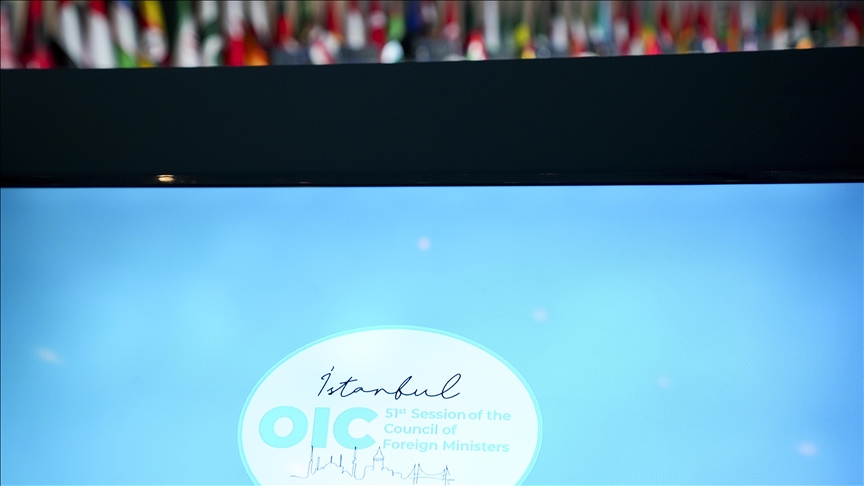Organization of Islamic Cooperation issues Istanbul Declaration condemns Israeli attacks, urging global action
Group slams Israel’s attacks on Iran, other states, urging global community to take 'deterrent measures'
 51st Meeting of the Council of Foreign Ministers of the Organization of Islamic Cooperation
51st Meeting of the Council of Foreign Ministers of the Organization of Islamic Cooperation
ANKARA/ISTANBUL
The Organization of Islamic Cooperation (OIC) issued the Istanbul Declaration on Sunday that strongly condemned Israel's recent attacks on Iran, Syria and Lebanon.
It urged the international community to take immediate deterrent measures.
The statement, released after the 51st session of the OIC Council of Foreign Ministers in Istanbul, described Israel’s actions as violations of international law and breaches of the sovereignty and security of the targeted countries.
The declaration “calls on the international community to take deterrent measures to stop this aggression and make Israel accountable for crimes committed.”
It also announced the formation of an open-ended “Ministerial Contact Group,” which will be tasked with establishing regular contacts with relevant regional and international parties to support de-escalation efforts, stop the aggression against Iran and achieve a peaceful settlement.
The declaration stressed the urgent need to stop Israeli attacks while also expressing serious concern about the dangerous escalation, which threatens the region's human, economic and environmental situation.
Highlighting the central role of the Palestinian issue for the OIC, it reaffirmed support for the establishment of a sovereign, independent Palestinian state with East Jerusalem as its capital, within 1967 borders.
It reiterated that the two-state solution remains the only valid framework for achieving lasting peace and stability in the Middle East.
The declaration also called for the prompt convening of a UN high-level conference on the peaceful resolution of the Palestinian issue and implementation of a two-state solution, co-chaired by Saudi Arabia and France, urging all UN member states to actively participate.
Condemning Israel's genocidal war in the Gaza Strip, including the systematic destruction to eliminate the Palestinian cause, the OIC reaffirmed “the importance of achieving a permanent and sustainable ceasefire and of implementing Security Council Resolution 2735, with a view to ending the aggression, advancing the Arab-Islamic recovery and reconstruction plan for the Gaza Strip, and ensuring the provision of political and financial support to the Palestinian Government to enable it to assume its responsibilities in the Gaza Strip, as it does in the West Bank, including Eastern Al-Quds.”
The declaration condemned Israel for blocking humanitarian aid and accused it of using starvation as a method of forced displacement. It demanded the opening of borders, unhindered delivery of aid and the protection of Palestinian civilians.
It expressed support for the UN agency for Palestinian refugees (UNRWA) and urged continued international political and financial backing amid worsening humanitarian conditions in occupied Palestinian territories, including Jerusalem.
Expressing deep concern about Israel’s attempts to alter the civilizational features of Jerusalem, especially efforts to change the status quo at the Al-Aqsa Mosque, the declaration emphasized “the need to preserve the identity of the Holy City as a symbol of tolerance and coexistence among the three monotheistic religions, and to support its steadfast inhabitants.”
The OIC also addressed regional issues, expressing solidarity with Pakistan amid recent military tensions in South Asia, and called for restraint and a peaceful resolution of disputes between Pakistan and India, including strict adherence to the Indus Waters Treaty.
The declaration expressed “deep concern over growing Islamophobia, a form of racism and discrimination, condemn all acts of violence based on religion or belief, hate speech and extremism motivated by discrimination on the grounds of religion, as well as efforts fueling intercultural divisions and tensions.”
It called on “the international community to take effective measures to combat extremism, hate speech, defamation of religions, negative stereotyping and the stigmatization of people on the basis of religion, belief or ethnicity at the national and global level.”
It also welcomed progress in normalization between Azerbaijan and Armenia, including the conclusion of negotiations on the Agreement on Establishment of Peace and Inter-State Relations, calling on Armenia “to address the remaining legal and political obstacles to for its signing, and thus, cease and desist from undermining the sovereignty and territorial integrity of Azerbaijan.”
It welcomed “the efforts of the Syrian interim government for the integration of Syria into the regional and international system,” stressing sustained political and financial support to Syria to ensure stability and security.
The declaration reaffirmed respect for the sovereignty, independence, territorial integrity and unity, and non-interference in the internal affairs of all the member states, highlighting support for the rights of Muslim Turkish Cypriots and the Turkish Muslim minority of Western Thrace and Turkish Muslim population of the Dodecanese in Greece.
It renewed “solidarity with the people of Jammu and Kashmir and express(ed) full support for their inalienable right to self-determination in accordance with the relevant UN Security Council and OIC resolutions, and the wishes of the Kashmiri people,” condemning human rights violations by India in the region.
The declaration expressed alarm about serious human rights abuses against Muslim communities in Myanmar, especially the Rohingya, and called for urgent international action to protect their rights.
The declaration referenced recent tensions in Bosnia and Herzegovina, urging all international partners to collaborate in ensuring adherence to the Dayton Peace Agreement and the Constitution of Bosnia and Herzegovina.
It welcomed Jordan’s efforts to protect holy sites in Jerusalem and expressed anticipation for the 2026 Islamic Summit Conference in Azerbaijan, to foster unity and cooperation in the Islamic world.
Anadolu Agency website contains only a portion of the news stories offered to subscribers in the AA News Broadcasting System (HAS), and in summarized form. Please contact us for subscription options.


